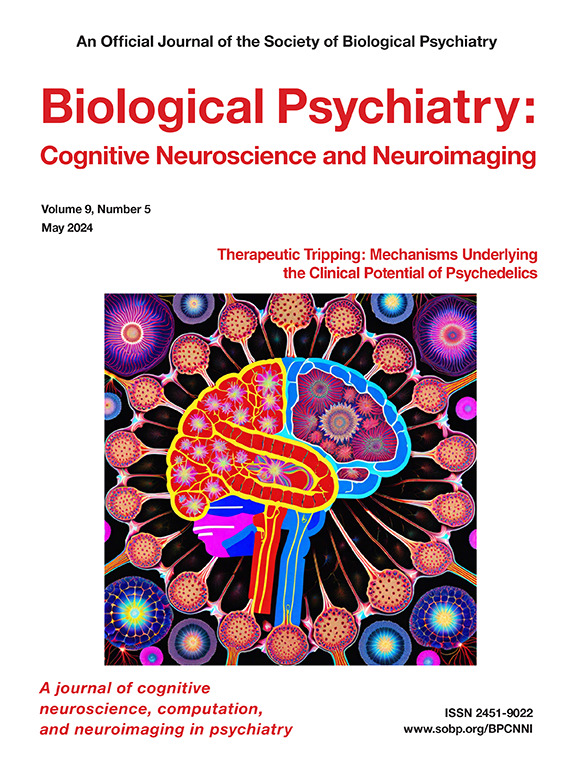Predicting Treatment Response of Repetitive Transcranial Magnetic Stimulation in Major Depressive Disorder Using an Explainable Machine Learning Model Based on Electroencephalography and Clinical Features
IF 4.8
2区 医学
Q1 NEUROSCIENCES
Biological Psychiatry-Cognitive Neuroscience and Neuroimaging
Pub Date : 2025-06-01
DOI:10.1016/j.bpsc.2025.02.002
引用次数: 0
Abstract
Major depressive disorder (MDD) is highly heterogeneous in response to repetitive transcranial magnetic stimulation (rTMS), and identifying predictive biomarkers is essential for personalized treatment. However, most prior research studies have used either electroencephalography (EEG) or clinical features, lack interpretability, or have small sample sizes. This study included 74 patients with MDD who responded (responders) and 43 patients with MDD who did not respond (nonresponders) to rTMS. Eight baseline EEG metrics and clinical features were sent to 7 machine learning models to classify responders and nonresponders. Shapley additive explanations (SHAP) was used to interpret feature contributions. Combining phase locking value and clinical features with support vector machine achieved optimal classification performance (accuracy = 97.33%). SHAP revealed that delta and beta band functional connectivity (F3-P7, F3-P4, P3-P8, T7-Cz) significantly influenced predictions and differed between groups. This study developed an explainable predictive framework to predict rTMS response in MDD, enhancing the accuracy of rTMS response prediction and supporting personalized treatment in MDD.
基于脑电图和临床特征的可解释机器学习模型预测重性抑郁症rTMS治疗反应
目的:重度抑郁症(MDD)对rTMS的反应具有高度异质性,识别预测性生物标志物对于个性化治疗至关重要。然而,目前的研究要么只使用脑电图或临床特征,要么缺乏可解释性,要么样本量小。方法:本研究纳入74例对rTMS有反应(Responder)的MDD患者和43例对rTMS无反应(NonResponder)的MDD患者。8个基线EEG指标和临床特征被发送到7个机器学习模型中,以区分响应者和非响应者。SHAP用于解释特征贡献。结果:相锁值(PLV)与临床特征相结合,支持向量机(SVM)的分类效果最佳,准确率为97.33%。SHAP结果显示,δ和β带功能连通性(F3-P7、F3-P4、P3-P8、T7-Cz)显著影响预测结果,且组间存在差异。结论:本研究建立了一个可解释的预测框架来预测MDD患者的rTMS反应,提高了rTMS反应预测的准确性,为MDD患者的个性化治疗提供了支持。
本文章由计算机程序翻译,如有差异,请以英文原文为准。
求助全文
约1分钟内获得全文
求助全文
来源期刊

Biological Psychiatry-Cognitive Neuroscience and Neuroimaging
Neuroscience-Biological Psychiatry
CiteScore
10.40
自引率
1.70%
发文量
247
审稿时长
30 days
期刊介绍:
Biological Psychiatry: Cognitive Neuroscience and Neuroimaging is an official journal of the Society for Biological Psychiatry, whose purpose is to promote excellence in scientific research and education in fields that investigate the nature, causes, mechanisms, and treatments of disorders of thought, emotion, or behavior. In accord with this mission, this peer-reviewed, rapid-publication, international journal focuses on studies using the tools and constructs of cognitive neuroscience, including the full range of non-invasive neuroimaging and human extra- and intracranial physiological recording methodologies. It publishes both basic and clinical studies, including those that incorporate genetic data, pharmacological challenges, and computational modeling approaches. The journal publishes novel results of original research which represent an important new lead or significant impact on the field. Reviews and commentaries that focus on topics of current research and interest are also encouraged.
 求助内容:
求助内容: 应助结果提醒方式:
应助结果提醒方式:


